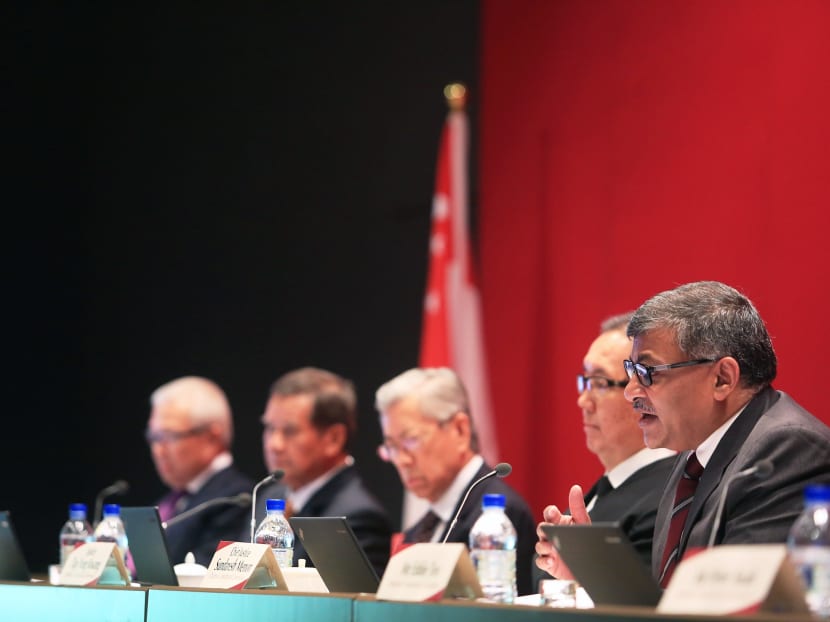Minority EP a key issue at Commission’s public hearing
SINGAPORE — The first public hearing conducted by the Constitutional Commission to review the office of the President on Monday (April 18) saw several individuals invited to air their views raise concerns about the Elected Presidency becoming politicised, as well as the proposal to safeguard minority representation in the presidency.

Members of the Constitutional Commission chaired by Chief Justice Sundaresh Menon (right), which was appointed to study various aspects of the Elected Presidency. Photo: Koh Mui Fong/TODAY
SINGAPORE — The first public hearing conducted by the Constitutional Commission to review the office of the President on Monday (April 18) saw several individuals invited to air their views raise concerns about the Elected Presidency becoming politicised, as well as the proposal to safeguard minority representation in the presidency.
Six of the nineteen who accepted the invitation to elaborate on their submissions to the commission spoke at the Supreme Court, among them law don Eugene Tan, legal intern Brian Chang, in-house legal officer Edwin Yeo, academic Mathew Mathews, researcher Loke Hoe Yeong and AWARE.
Mr Chang, citing countries like Lebanon, which reserved political positions for certain ethnicities, was worried that implementing a similar system here would lead to race-based politics.
“I think we need to be very careful with whether we want to introduce race-based criteria which do not exist at the moment into any of our political offices and if we want to take the first step down the (slippery) slope,” he added.
Associate Professor Tan acknowledged that it is worrying that it has been 46 years since Singapore had a Malay President (Dr Yusof Ishak). But he pointed out: “Much as I and many Singaporeans do want the President to be a symbol of multi-racialism, I am not so sure that…to engineer a (minority) President, that is going to help the office of the President to be a unifying force.”
The Constitutional Commission was appointed to study three aspects of the Elected Presidency: the eligibility criteria for presidential candidacy, provisions to safeguard minority representation in the presidency and the framework governing the exercise of the President’s custodial powers, particularly the role and composition of the Council of Presidential Advisers (CPA).
Acknowledging these views, Chief Justice Sundaresh Menon, who chairs the commission, noted the unique function of the Elected Presidency, and asked if the current state of affairs was acceptable given that there has not been a Malay candidate elected over the last few decades.
Mr Chang suggested creating a new vice-president role, which will be constitutionally required to be of a different race from the President, or creating two co-presidents who are required to be of different races and will rotate between two three-year terms.
Mr Loke, who also proposed a vice-president role, said such a system would “introduce a greater element of flexibility”. Further provisions could be made for the Constitution to ensure it does not get stuck in gridlock, said Mr Loke, who is also a Singapore People’s Party member, but stressed he was speaking in his personal capacity.
Mr Yeo, who was concerned about the political divisions that ensued in the last presidential election in 2011, said the system could revert to one where a candidate was nominated by the Prime Minister, in consultation with the CPA. This would need to be endorsed by Parliament, and then go through a round of “yes and no” voting by the electorate. Such an arrangement would allow for minority candidates to be put up for selection from time to time, said Mr Yeo.
Proposing changes to the Elected Presidency in January, Prime Minister Lee Hsien Loong had said Singapore should consider a “mechanism” to ensure that minorities can be periodically elected if there has not been particular minority as president “for some time”.
Dr Mathews supported the idea, adding that his research showed that people tend to have affinity for their racial identities and beliefs.
Asked by Mr Abdullah Tarmugi, commission member and member of the Presidential Council for Minority Rights, if this would be seen as tokenism, Dr Mathews said: “I think it’s how the President goes about then correcting it, to show that he’s not a token, but someone who’s got mettle, and the strength.”
The need to keep the EP above politics was also raised by some of the speakers, including Assoc Prof Tan, who suggested that any changes to the presidency’s eligibility criteria be effected after the upcoming presidential election, which must be held by August 2017. Also, the reasons for rejecting a candidate should be made public so that the situation does not become politicised, he said.
Speakers were also concerned that tightening the eligibility criteria for candidates would drastically limit the pool to choose from. CJ Menon, commenting on this, had noted that the number of companies with paid-up capital of S$100 million has gone up to over 2,000, expanding the pool of potential candidates.
But Assoc Prof Tan said empirical evidence is needed to show that enough minority race candidates would emerge from this pool.
Two representatives from AWARE also called for a less stringent eligibility criteria, in order to draw from a more diverse group. Displaying photos of the Cabinet members and previous Presidents to show the under-representation of women, AWARE pointed out Singapore is “more than ready” for a female President.
Prof Chan however, said she did not share such a “pessimistic” view, noting that nearly 25 per cent of MPs are women. “I don’t think we should lower the criteria for women to come in just to make it more accessible to compete (on an equal standing),” she said.
The next public hearings will be held on Friday (Apr 22), April 26 and May 6. The commission is expected to complete its report and make its recommendations by the third quarter of this year.






